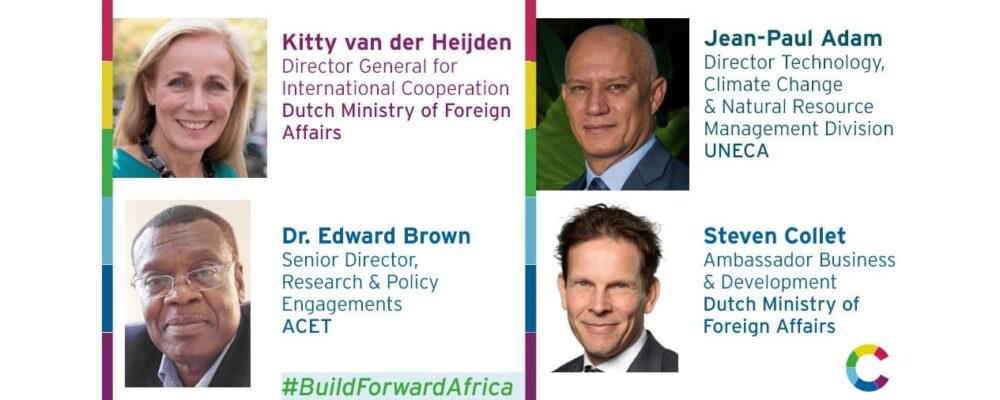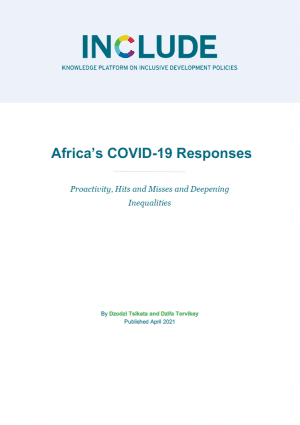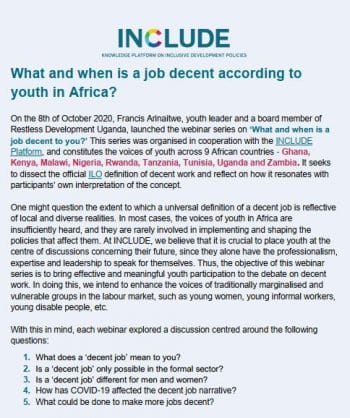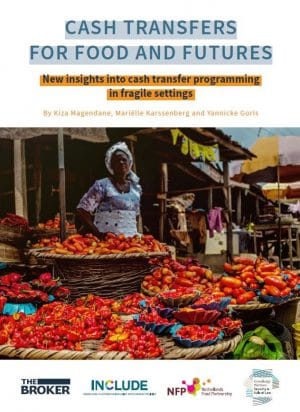
For many African countries, COVID-19 was a crisis within – and on top of – already existing crises. However, this pandemic has also present us with a chance to build forward more inclusively. The recommendations of the high-level speakers who opened the INCLUDE conference on ‘Building forward more inclusively’ revolve around the 3-E’s: the economy, equity and the environment. Read these recommendations, as well as the key takeaways from the conference, while awaiting the conference report, which will be released at the end of July.
Despite some positive signs of resilience, it is evident that COVID-19 has, and will continue to, exacerbate existing inequalities. Hence, the post-COVID-19 socio-economic recovery in Africa should aim to tackle these inequalities and promote inclusive development, while adapting the current approach to development aid. The following recommendations, presented in the opening session of the INCLUDE conference on 8 June 2021, revolve around the 3-E’s – the economy, equity and the environment – and should be read keeping in mind that the impacts of climate change are as pronounced as those of COVID-19:
- Recommendation 1: The focus of socio-economic recovery measures should be on youth, women, and other vulnerable and excluded groups and how to make them ‘bankable’.
- Recommendation 2: Holistic social protection programmes, but also digitalization and innovation, can play an important part in the recovery process.
- Recommendation 3: There is a need for quick, immediate and substantial financing that addresses structural barriers and promotes inclusive policies.
- Recommendation 4: Donors must respect their pledges and financial commitments.
- Recommendation 5: Increased cooperation should take place with and between African countries, and local actors should be given the space to take the driver’s seat in this process.
- Recommendation 6: For more effective multistakeholder dialogues, the gap between research, policy and practice should be bridged with the help of established and dedicated knowledge platforms.
These recommendations were suggested by the high-level speakers who contributed to the conference opening:
- Kitty Van Der Heijden, Director General for International Cooperation, Dutch Ministry of Foreign Affairs
- Dr Edward Brown, Senior Director, Research & Policy Engagements, African Center for Economic Transformation (ACET)
- Jean-Paul Adam, Director, Technology, Climate Change and Natural Resource Management Division, United Nations Economic Commission for Africa (UNECA)
- Steven Collet, Ambassador Business & Development, Dutch Ministry of Foreign Affairs
Re-watch the opening session:
Please accept marketing-cookies to watch this video.
This was only the beginning of 10 days of fruitful and productive exchanges between 50 expert speakers, session chairs and moderators, and a diverse audience. The sessions tackled themes around COVID-19 and inequality, youth employment, social protection and the African Policy Dialogues. The key messages from each of the 5 thematic sessions, as well as the opening and closing keynote speeches, are summarized as follows.
Key messages from conference sessions
Opening session: After the COVID-19 shakeup: realities and opportunities for Africa’s development partners
To tackle the two multidimensional emergencies currently facing Africa, COVID-19 and climate change, an integrated approach that simultaneously accounts for the economy, equity and the environment is required.
Thematic session 1 – The (un)expected evidence: COVID-19 and inequalities
While the responses of African governments to COVID-19 have showcased innovative, digital solutions, in some cases they have also exacerbated existing inequalities, infringed on human rights and failed to institutionalize proper implementation frameworks to ensure resilience.
Thematic session 2 – Merging perspectives on decent employment for Africa’s youth post-pandemic
Barriers to decent youth employment can be overcome by following the principles of ‘human economy with the youth at its heart’: 1) the modernization of education systems; 2) the creation of more and better employment opportunities (by public and private sectors); 3) economic growth centred around inclusive private sector development; and 4) the promotion of meaningful youth participation.
Thematic session 3 – Uganda’s way: youth employment and participation post-COVID
Although structural issues related to too few jobs are to blame for youth unemployment in Uganda, the entire value chain of agricultural production seems to be the most promising growth sector for enhancing youth employment.
Thematic session 4 – Donor meets policymaker: modelling social protection responses on the continent
Social protection programmes are instrumental for poverty and inequality reduction. The success of their implementation, however, requires the involvement of several strategic development actors and pragmatic compromise in light of budgetary deficits.
Thematic session 5 – Resilience amidst COVID-19: approaches and strategies from the African Policy Dialogues (APDs)
The different responses of the Mozambican, Ghanaian and Kenyan governments to the COVID-19 pandemic, which have prompted ADP partners to undertake divergent policy influencing approaches in each country, underline the importance of localization and context-specificity in policy making during times of crisis.
Closing session – Conference highlights and innovation strategies for a post-pandemic African
To build forward more inclusively emphasis should be placed on three key issues: 1) youth and decent employment; 2) digital innovation and its institutionalization to ensure resilience; and 3) climate adaptation and mitigation.


